- Home
- Iris Murdoch
Bruno's Dream Page 7
Bruno's Dream Read online
Page 7
Diana supported, even invented, the formalities of their life together. She made the little house in Kempsford Gardens as ceremonious as an old-fashioned manor house. Meals were punctual and meticulously served. Miles was not allowed in the kitchen. The house was always filled with flowers with never a petal out of place. Miles was forced to adopt a standard of tidiness which he found unnatural and absurd and to which he became completely used. It was as if Diana was determined to make him feel that he was living rather grandly and after a while he did begin to feel it. She had a power of making small things seem large, just as she had uncannily made the garden seem large, made it seem to go on and on like an enchanted garden in a tale. Miles suspected that, in all this, Diana was fighting back against her childhood in Leicester. She had once said to him thoughtfully, ‘You were the most distinguished of all my suitors.’ Diana had her own strict routine, her own invented personal formalities. Entirely without other occupation, she filled her time with household tasks and enjoyments. There was her hour for working in the garden, her hour for doing the flowers, her hour for doing embroidery, her hour for sitting in the drawing room and reading a leather-bound book, her hour for playing on the gramophone old-fashioned popular music which Miles disliked, but to which also he had become accustomed. Diana would have enjoyed an eighteenth-century country house life of peaceful ennui and formal tedium and lengthy leisured visiting. In the midst of one of the seedier parts of London she almost succeeded in conjuring it up.
A change came into the life of Miles and Diana. Perhaps in a way they welcomed it, though at first it made both of them rather apprehensive. Diana’s younger sister Lisa had made a very different start in life. She read Greats at Oxford and got a first. She went to teach in a school in Yorkshire and joined the Communist Party. Diana, who was very fond of her sister, lost touch with her for a while. Lisa came south for Diana’s wedding and met Miles. Then she vanished again and when next heard of she had become a Catholic and joined the order of the Poor Clares. ‘I’m sure she was just attracted by the name,’ Diana told Miles. ‘She was always rather a literary girl.’ After a few years Lisa emerged from the Poor Clares and the Roman Catholic Church and went to live in Paris. She came back to England with tuberculosis and stayed with Miles and Diana during her convalescence. She got a teaching job in a school in the East End. The idea vaguely materialised that she might stay on living with Miles and Diana. She stayed on.
All three of them needed a lot of persuading that it was a good idea but were at last entirely persuaded and soon it all began to seem quite natural. Perhaps Lisa seemed to fill the gap left by the absent child in the life of the married pair. The sisters were deeply attached to each other and Miles came to be fond of his sister-in-law and to rely upon her presence. He enjoyed the sisterness of the two women, the fugitive resemblances. He liked it in the evenings when he found them sitting together sewing. Lisa, not by nature orderly, had surrendered, even sooner than Miles had done, to Diana’s domestic tyranny. It was good, after all these years à deux, to have an extra person in the house, to have in the house two women both devoted to his comfort. Perhaps he had been alone with Diana for a little too long. The extension of their society was refreshing and enabled him to see his wife in a new light.
Also in some vague yet evident way Lisa did need looking after. Diana used to generalise about her sister. ‘She has somehow missed the bus of life.’ ‘She is like someone who breaks his bones if he falls over.’ ‘She has lost the instinct for happiness.’ ‘She is a bird with a broken wing.’ Lisa was graver, gaunter, darker than Diana and was usually taken to be the elder sister. She was nervy and reticent and silent and solitary though she sometimes talked philosophy with Miles and was more ardent than he to complete the argument. Sometimes they got quite cross with each other and Diana had to part them. Lisa appeared to be contented in her school work and in the holidays did voluntary work for the local probation officer. Miles enjoyed her company. She puzzled him and he pitied her. She seemed a cold dewy yet wilting flower. Sometimes indeed she seemed to him simply an apparition, a shadow beside the solid reality of her sister. He and Diana shared an anxiety about her which occupied them not unpleasantly.
The sky was almost dark now, hung with a blazing evening star with tiny pinpoints of other stars round about it. The traffic was humming evenly in the Old Brompton Road. A blackbird, who always sang at the last light, was unwinding in a nearby tree the piercing and insistent pattern of his Kyrie. The damp air was turning chill in the darkness. Down below something pale was moving. A woman in a pale dress was walking slowly across the paving stones and along the path of clipped grass toward the archway. Which of them was it? The obscurity defeated his eyes as he watched the moving figure in silence.
Suddenly the light in the room was switched on.
Miles turned round abruptly and then with the same movement closed the window and pulled the curtain.
‘Diana, I wish you wouldn’t do that!’
‘I’m so sorry.’
Diana was dressed in an old-fashioned blue embroidered kimono. Her straight hair, not yet grey, had paled without losing its lustre, to a sort of pearly sandy yellow. Her ivory face was unlined, like a face in a miniature.
‘I’m sorry, I wasn’t sure if you were here.’
‘Where else would I be at this time for heaven’s sake? I wish you wouldn’t come porlocking. I’m trying to work. What’s that you’ve got there?’
‘A letter someone delivered by hand. It said “urgent” so I thought I’d bring it up at once.’
‘Don’t go, sweet. Forgive me. Who the hell’s it from, I don’t know the writing.’ Miles tore the letter open.
Dear Miles,
I expect you will be surprised hearing from me like this out of the blue. The thing is this, your father is ill, as you know, and although there is no immediate cause for concern he is naturally thinking in terms of arrangements and all that. He would like to see you. He wants me to emphasise that he has nothing special in view here but just feels that he wants to see his son. I very much hope that you will feel ready to see him, as he is anxious to see you. As you haven’t met for such a long time I thought it might be a good idea if you and I had a preliminary talk about it first, so that I can sort of put you in the picture. I very much hope that you will agree to this. I will, if I may, telephone you at the office tomorrow morning and find out what time would be convenient for me to visit you. I very much hope that all this can be arranged amicably. Your father is an old man and very far from well.
Yours sincerely,
Danby Odell
‘Oh God,’ said Miles.
‘What is it?’
‘A letter from Danby.’
‘Danby? Oh, Danby Odell. What does he want?’
‘He wants me to go and see my father.’
‘Isn’t it odd,’ said Diana, pushing her hair back behind her ears, ‘that in all these years I’ve never met either your father or Danby Odell. Is it urgent, I mean is the old man on the point of death?’
‘Apparently not.’
‘You’ll go of course? I’ve been feeling for some time that you ought to do something about it.’
Miles threw the letter down on the table. He felt exasperation and an uneasy feeling rather like fear. ‘Well, hell, I’ve been writing polite letters to the old bastard all these years and he’s never replied. And now that fool Danby writes as if it was somehow all my fault.’
Diana had picked up the letter. ‘I think it’s quite a nice letter. He doesn’t imply it’s your fault.’
‘Yes he does. Oh Christ.’ Miles did not want this now. He did not want emotions and memories and scenes and unmanageable unforseeable situations. He did not want to go through the rigmarole of forgiving and being forgiven. It would all be play-acting. It would be something hopelessly impure. And it might delay, it might offend, it might preclude for ever the precious imminent visitation of the god.
7
DANBY STRAIGHTENED HIS ti
e and rang the bell. Miles opened the door.
‘I hope I’m not too early?’
‘Come in.’
Miles turned round and walked upstairs leaving Danby to shut the door. After a moment’s uncertainty Danby shut the door and followed his host up the stairs. Miles had already disappeared into one of the rooms. Danby approached an open door and saw Miles standing over by the window with his back half turned. Danby entered the room and closed the door.
Danby had chosen the time of six-thirty in the evening for their interview on the assumption that Miles would be certain to offer him a drink, which would help him through the interview. He had not however omitted to drink two large gins at the Lord Clarence before turning into Kempsford Gardens. The room was dark. The sky outside was a glittering grey.
Viewed at close quarters, the idea of actually confronting Miles had alarmed Danby considerably. It was not that he was worrying about the stamps. Bruno’s seeing or not seeing Miles would probably make no difference to their destination. He had not really believed that Bruno was serious about seeing his son. Bruno had speculated about this before and nothing had come of it; he had speculated about it at earlier times when he was very much more enterprising and resolute than he was now. Danby had come to feel that Bruno had settled down peacefully into the last phase of his life, wanting simply to be left alone with his routine of stamps and telephone and evening papers, with his eyes fixed, if not upon eternity and the day of judgement, at least upon some great calm and imminent negation which would preclude surprises, demarches, and the unpredictable. He had underestimated Bruno, and when he suddenly perceived the strength of will that still remained inside that big head and shrivelled body he had experienced a shock and had had rapidly to re-examine his own conception of Miles.
Miles had been filed away for years. Without reflection, Danby had assumed that he would not see Miles again. There could be no occasion except possibly Bruno’s funeral. Danby occasionally imagined Bruno’s funeral, how it would be. He imagined his own feelings of tenderness and regret and relief, the solemnity of the scene, the silent bow to Miles. Now suddenly there was this curiously naked and unnerving and quite unscripted encounter with a man who was a stranger and who yet was, as Danby had realised in the short while that had intervened since Bruno’s decision, somehow rather deeply involved in Danby’s life. He could only be indifferent to Miles at a distance. Close to, Miles was an interesting, disturbing, even menacing object.
Although Miles and Danby were about the same age Danby had always felt as if Miles were his senior. He had taken this attitude over from Gwen, who had revered her brother and regarded him as an oracle. Danby had early accepted the notion that Miles was something remarkable, and he had now to remind himself that really Miles was a very ordinary person, even by some standards a failure. Before he had ever met Miles he was already a bit afraid of him, and more rationally afraid of his power over Gwen. Miles had not concealed his opinion of Danby, and this had caused Danby considerable pain, even after he had made certain that Gwen was not going to allow her brother to forbid the banns. Danby, as he now realised, standing in the dark room looking at Miles’s back, as indeed he now knew he had simply forgotten, had genuinely admired Miles in the days gone by. And the shock of his presence brought to Danby again that old familiar humiliating sensation mixed of fear and admiration and bitter hurt resentment.
Miles turned and indicated an armchair beside the fireplace and Danby sat down.
‘Look here,’ said Miles. He sat down on an upright chair beside the window. ‘What is all this?’
‘It’s fairly clear I should have thought,’ said Danby. ‘Bruno wants to see you.’
‘Does he really?’
‘Well, he says he does and goes on saying it. I’m not a mind reader.’
Danby had thought a lot beforehand about this interview without being able to decide upon the tone of it. The tone would have to be settled impromptu. And here he was already becoming aggressive.
‘It seems a bit pointless after all these years,’ said Miles. He was folding a piece of paper, not looking at Danby. The room was getting darker.
‘He’s dying,’ said Danby. He felt a rush of emotion, an obscure feeling which connected together Bruno, Gwen, Miles’s profile seen against the glowing dark grey window.
‘Yes, yes,’ said Miles in an irritable voice. ‘But children and parents don’t necessarily have anything to say to each other. I’m not conventional about this and I shouldn’t have thought that Father was.’
His saying ‘Father’ like that brought back Gwen, even the tones of her voice. Danby said, ‘He wants to see you. Any discussion is just frivolous.’ Miles stiffened and threw the paper away, and Danby felt that it was rather strange and wonderful for him to be calling Miles frivolous. He noticed with satisfaction that Miles’s tossed hair was falling apart to reveal a bald patch.
‘I’m afraid you are not being very clear-headed,’ said Miles. ‘My point concerns my father’s welfare. An interview with me might upset him seriously. I mean, the situation has to be thought about. Does Father propose that we should see each other daily, or what?’
Christ, you cold-blooded bureaucrat, thought Danby. ‘I don’t think Bruno has thought it out beyond the idea of just seeing you once.’
‘I see no point in our meeting once.’
‘I mean, after meeting once you’d both just have to see how you felt.’
‘I think this could be very agonising indeed for my father, and I’m surprised you didn’t dissuade him. You must have control over him by now.’
Was that a reference to the stamps? ‘Bruno controls himself, I don’t run him.’
‘If we meet once either to meet again or not to meet again may be equally dreadful.’
It occurred to Danby for the first time that there might indeed be a problem here. Like Bruno he had not thought beyond the first occasion. ‘You’re complicating the matter,’ said Danby. ‘You are after all his only child and he is near death and wants to see you. It seems to me a matter of plain duty, whatever the consequences.’
‘One cannot divorce duty from consequences.’
‘Oh all right,’ said Danby, standing up abruptly and pushing his chair back. ‘Shall I go back and tell him you won’t come?’
‘Sit down, Danby.’
Danby hesitated, shuffled his feet and sat down slowly.
‘I’m sorry,’ said Miles. ‘I probably sound rather hardhearted, but I want to see what’s involved. I think we might turn the light on.’ He pulled the curtain and moved to the electric light switch. Danby gritted his teeth.
Miles was not really very like Gwen, and yet there were details of her face which memory and even photographs had retained for Danby only in a hazy generalised form which were now suddenly manifest in flesh and blood clarity: the sharply marked mouth with the deep runnel above it, the brow coming closely down over the intent eyes, the heavy quality of the dark hair.
Danby looked away and looked quickly about the room which was now revealed by two green-shaded lamps. It was a book-lined room, evidently a study. A table was half drawn up under the window, covered with neatly squared off piles of paper and notebooks and an orderly row of ballpoint pens. The clean open fireplace contained a pyramid of fir cones and was surrounded by William Morris tiles which gleamed in a swirling profusion of blues and purples. Gwen would have liked those tiles. She would have enjoyed collecting the fir cones. There was a vase of daffodils on the white painted mantelshelf, and a small square gilt mirror above it. Here and there a shelf of books had been cleared to display glittering Chinese porcelain, ultramarine ducks, dogs, dragons. Everything looked formidably neat and clean. A donnish room: and yet the flowers and the ducks and the fir cones did not seem quite like Miles. Vaguely, and the thought somehow disturbed him, Danby remembered that Miles was married.
‘Quite honestly,’ Miles was going on. He had sat down again and was intent on folding pieces of paper and cutting them carefully w
ith a sharp knife. ‘Quite honestly, I rather dread this operation not only because of what it might do to him, but also because of what it might do to me. I’m rather through with the emotions, that kind anyway, and I’ve got other things to do. Is it all about money?’
‘Money?’ said Danby. ‘Good Lord, no!’ Or was it? Perhaps after all Bruno just wanted to decide the destiny of the stamps. Damn the stamps, they complicated everything.
‘You see,’ said Miles, concentrating upon a neat clean severance of a folded sheet. ‘You see, I don’t know whether you know this, but I’ve been writing to my father regularly for years, and I’ve never had any reply. I rather assumed he’d written me off. This desire to see me is a bit surprising. Is he senile?’
‘No!’ said Danby. ‘He has to take various drugs and some days he gets a bit vague and rambles a little, but on the whole he’s perfectly clear-headed. He’s certainly still a rational being.’
‘Is he much–changed?’
‘Physically, yes. Not in other ways. I suppose you know what’s wrong with him?’
‘Oddly enough I do,’ said Miles slowly, raising his brooding eyes in a significant way which was very reminiscent of Gwen. ‘Oddly enough I do. I wrote to his doctor about eighteen months ago. I suppose there’s no new development?’
‘No. Just the progress of the–thing.’
They were silent, Danby watching Miles and Miles intently examining a piece of cut paper. ‘All right. I’ll come and see him. But I think it’s going to be awful. Awful.’
Danby stood up. He felt a strange defensive tenderness for Bruno combined with an acute wish that Miles would offer him a drink. He wanted to be asked to stay, given a drink, somehow comforted by Miles. He would like to have talked about the past. ‘Bruno has been very brave.’

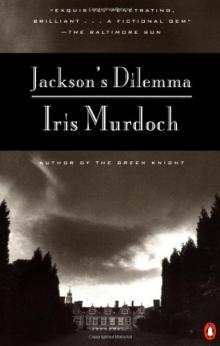 Jackson's Dilemma
Jackson's Dilemma The Flight From the Enchanter
The Flight From the Enchanter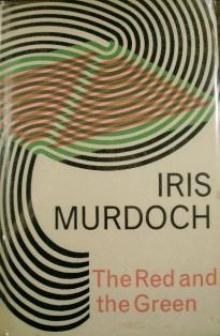 The Red and the Green (Vintage Classics)
The Red and the Green (Vintage Classics) A Severed Head
A Severed Head The Black Prince
The Black Prince The Nice and the Good
The Nice and the Good The Unicorn
The Unicorn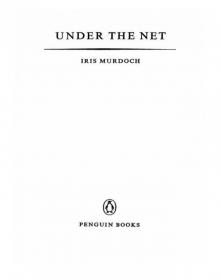 Under the Net
Under the Net The Italian Girl
The Italian Girl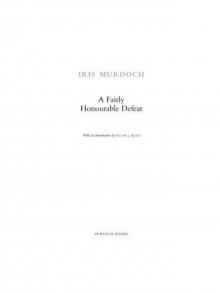 A Fairly Honourable Defeat
A Fairly Honourable Defeat An Accidental Man
An Accidental Man A Word Child
A Word Child The Philosopher's Pupil
The Philosopher's Pupil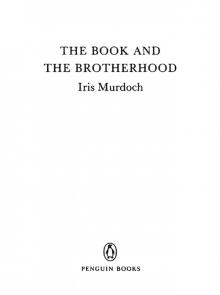 The Book and the Brotherhood
The Book and the Brotherhood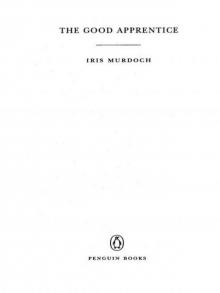 The Good Apprentice
The Good Apprentice The Sacred and Profane Love Machine
The Sacred and Profane Love Machine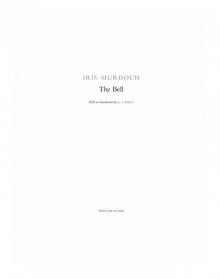 The Bell
The Bell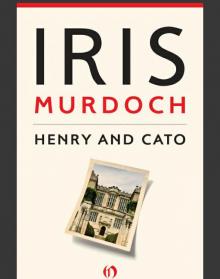 Henry and Cato
Henry and Cato Metaphysics as a Guide to Morals
Metaphysics as a Guide to Morals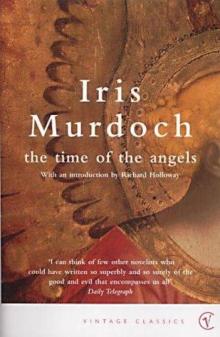 The Time of the Angels
The Time of the Angels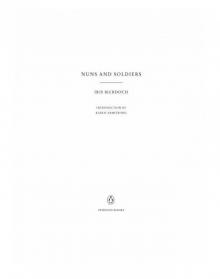 Nuns and Soldiers
Nuns and Soldiers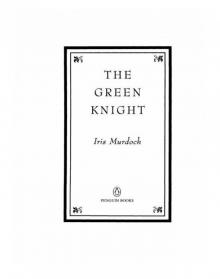 The Green Knight
The Green Knight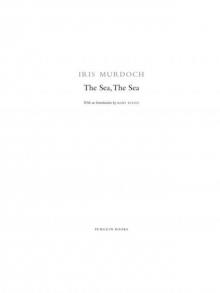 The Sea, the Sea
The Sea, the Sea Sartre: Romantic Rationalist
Sartre: Romantic Rationalist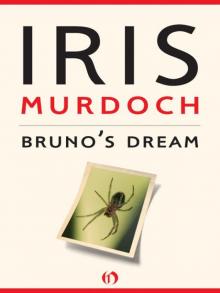 Bruno's Dream
Bruno's Dream An Unofficial rose
An Unofficial rose Sartre
Sartre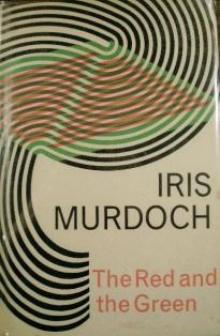 The Red and The Green
The Red and The Green